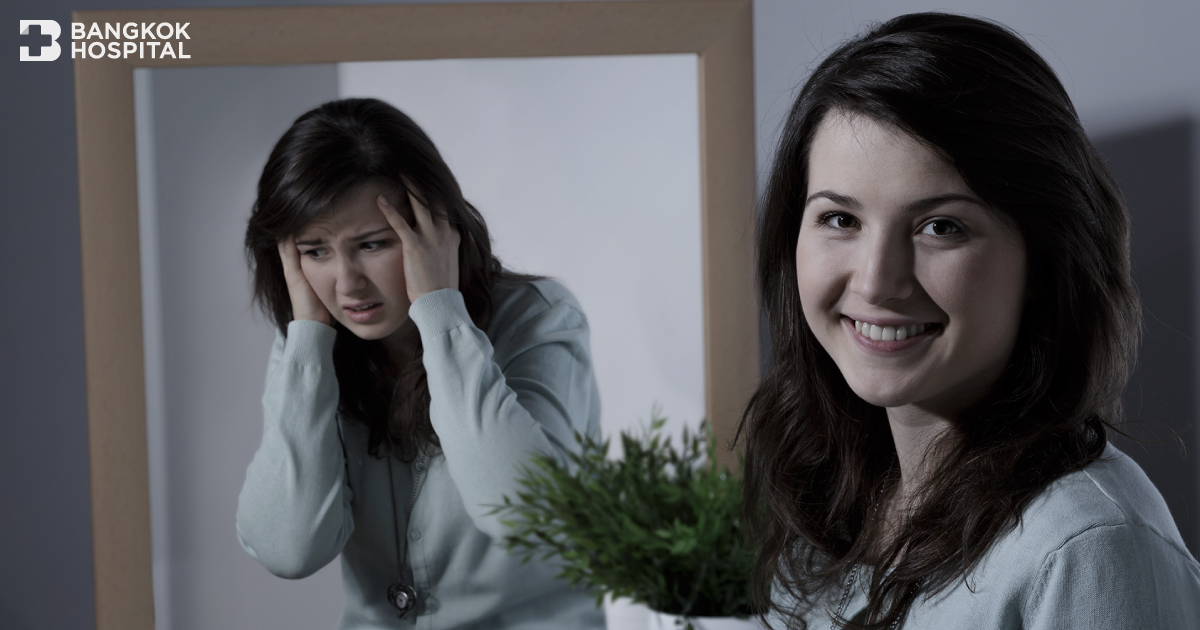Mood swings are an emotional disorder that can vary extremely, both in excitement (Mania) and in deep sadness (Depress), which can cause significant damage to oneself and others as seen in the news quite often. The exact cause is still unknown, it is believed to be a genetic disorder, but it could also be due to chemical changes in the brain, whether from drugs, substance abuse, or some physical illnesses. General statistics show a prevalence rate of this disorder at 1 – 2% of the population.
Signs of mood swings
The symptoms can be on both extremes, but some people may experience just one extreme, which is excitement (Mania) without any history of depression (This type is called Bipolar I Disorder). Another part may predominantly experience sadness with a little excitement (Hypomania) at times (called Bipolar II disorder).
1) Symptoms of excitement (Mania and Hypomania)
The symptoms of strong excitement (Mania) and mild excitement (Hypomania) are the same, only the severity of what is called mild excitement (Hypomania) will not be as extreme.
Symptoms include:
- Feeling overly excited, excessively happy, and elated
- Having a lot of energy, being very active, or may be restless or even easily irritated
- Having unfounded high self-confidence, or feeling grandiose, even when it’s not true
- Requiring less sleep, for example, feeling sufficient with just 3 hours of sleep
- Talking more than usual or feeling the pressure to keep talking
- Having a lot of rapid, racing thoughts
- Easily switching focus from one thing to another, swayed by stimuli
- Engaging in goal-oriented tasks or aimless activities excessively, sometimes appearing very restless
- Often making poor decisions, such as spending money recklessly, bad investments, or risky sexual behavior
2) Symptoms of sadness (Depress)
Being sad or in a mood of sadness often makes it difficult to carry on with regular life activities, such as work, study, social interaction, or even in relationships.
Symptoms include:
- Feeling sad, empty, hopeless, crying easily
- Losing interest in activities that used to bring joy
- Might have a lack of appetite leading to weight loss, or the opposite, increased appetite
- Having sleep issues or wanting to sleep all the time without wanting to do anything
- Some may feel restless or move slower
- Feeling fatigued, without energy
- Feeling worthless or guilty unreasonably
- Struggling to concentrate, indecisiveness
- Some may have thoughts of self-harm, including suicidal thoughts
Both extremes, which differ significantly from one’s usual temperament or personality, occur almost all day or for most of the day, and continue for days or weeks before a diagnosis can be made. However, diagnosis might not be straightforward thus should be evaluated by a psychiatrist.
Treatment for mood swings
Treatment for Bipolar Disorder can be done in multiple ways, including:
- Medication is the most effective treatment for this disorder. Medication often takes some time (Lag Time) to begin working, and it is necessary to take it every day continuously. Many cases require lifelong medication even after symptoms have subsided to prevent recurrence. As medications can have side effects, patients must adhere strictly to the prescribed medications, and relatives should ensure the patient takes the medication as directed by the doctor. Any side effects can be discussed with the doctor to mitigate, reduce, or adjust to suit each patient’s needs. Moreover, medications come in various groups, and sometimes several groups are used together depending on the symptoms. These include Mood Stabilizers, Antipsychotics, Antidepressants, and Anti-Anxiety medications.
- Hospitalization in severe cases that might lead to harm to the patient themselves or others, such as conflicts, violence, risky behaviors, reckless spending, improper transactions, self-harm, or suicidal thoughts in cases of depression, etc.
- Counseling and Behavior Modification to control moods can help patients lead a normal life.
Additionally, in cases where the patient uses or is addicted to substances, simultaneous rehabilitation is necessary, and this factor makes the treatment of mood swings more challenging.


